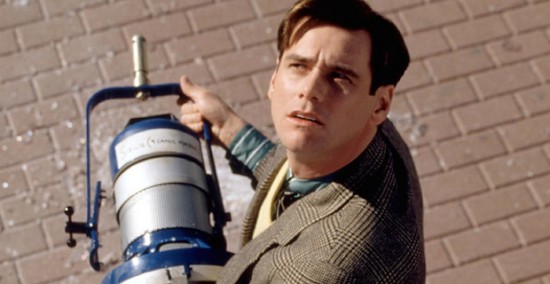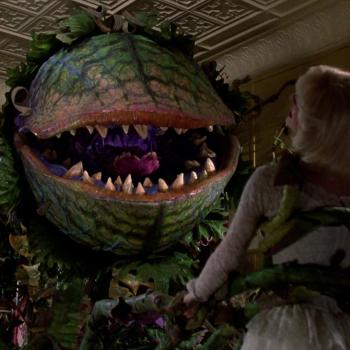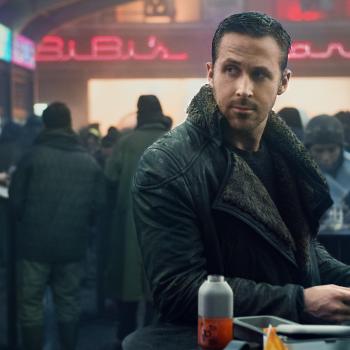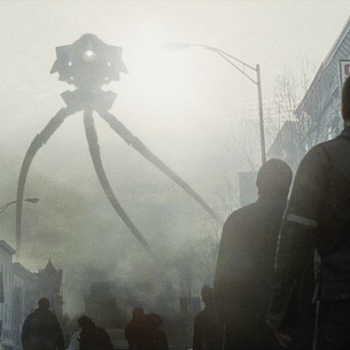Reality (TV) intrudes
It’s a crash from heaven that rouses Truman from his stupor. One morning, as he gets ready to head to work, a light from the top of the dome falls to the ground and shatters. The producers hop quickly into action, prompting the radio deejays to concoct a story about parts falling from airplanes.
But that one innocuous chip at reality is all it takes for Truman to begin asking questions. We quickly see that for all the cheeriness surrounding him, he knows something’s missing. The mysterious woman who briefly stole his heart in high school (Natascha McElhone) has never been far from his thoughts — Truman is piecing together a collage to recreate her face, and he makes calls to “Fiji” — where he believes she lives — hoping to track her down. He’s already suspected something was off — this new incident confirms it.
What’s more, the break in Truman’s carefully constructed world is followed by a reminder of past trauma, as Truman’s father unexpectedly crashes the set. Yes, his reappearance first calls to mind the tragedy that fueled Truman’s fear of the water. But it also increases the volume of that nagging voice in Truman’s heart. Spurred on by cracks in the world, Truman begins to see that things aren’t as they seem. There’s an elevator that opens into a catering area for the actors. The photo of Meryl crossing her fingers at their wedding. The commands to the actors that Truman’s car radio picks up. In one of my favorite scenes, Truman — beginning to pick up that everything revolves around him — gets out of his car to direct traffic. Something’s not right with the world and it fascinates Truman, jarring something loose that had been long-dormant.
And while everything is still bright on the surface, we begin to detect sinister undertones. Weir, often adopting the POV of the millions of cameras around Sea Haven, never drops the bright facade, but it feels chillier. Laura Linney, so fantastic here, turns Meryl’s smiles into something hollow and cold — we begin to see her less as a friend and more as a captor. The look of Sea Haven, so beautiful and colorful, begins to feel plastic the more Truman realizes what a fabrication it is.
This is what happens when our hearts wake up and we see just how carefully constructed this system is. About 10 years ago, I was driving when I suddenly took note of just how many fast food franchises littered a one-mile stretch of road. I’d driven that way every day since I’d had my license and just accepted the Burger King, Tubby’s, Rally’s, Taco Bill and Arby’s as normal. Out of the blue, it occurred to me just how weird it is to live in world with this much stuff thrown at us while people starve on the other side of the globe. It sickened me. It’s the same feeling I get these days when I take note of the thousands of commercials thrown at us, with companies telling us what we need to make us happy, or when I hear people talk about what we need to acquire to live “the good life.” It’s all a system. It’s all broken. It’s all false. And if you look hard enough, you can see the strings being pulled to keep us content, predictable consumers who stay in line.
Of course, what happens when we act on this? When we decide that the system that currently has us all in its grasp is broken? When we listen to that nagging in our hearts and begin to pursue something more? When we go off the beaten path, abandon what everyone sees as “normal” and start to live from our passions?
We look crazy.
I remember talking with a friend shortly after “The Truman Show” was released about how much I loved Jim Carrey’s performance. My friend admitted that it was a good performance, but she wasn’t as impressed. “It’s just an everyman role,” she told me. “Anyone could do that.”
The more the film ages, the more I’m convinced she was wrong. Carrey is perfect for this role, which I think is the best performance of his career. Yes, he can play the everyman. But it’s that slightly “off” part of Truman’s personality that Carrey sells so well. Truman’s not a normal guy. Yes, he has a typical job and a life in the suburbs. But he talks like a 1950s television character. He plays out elaborate fantasies in the bathroom mirror. But while it’s all an exaggeration, audiences at that time would have seen it as a toned-down version of Carrey’s shtick — which found himself talking out of his butt cheeks in “Ace Ventura” and screaming like a buffoon in “Dumb and Dumber.” It’s both exaggerated and reined in…and creates a character who feels real, but just slightly off.
As Truman uncovers more about what’s going on, Carrey indulges a bit more of that manic persona. One scene finds Truman sitting in his car with Meryl, telling her about the routines he’s discovered surrounding him. It’s the scene where we’d normally expect to find the wild-eye protagonist piecing together his conspiracy, and it’s the one moment where Carrey is allowed to indulge his larger-than-life tics. Truman explodes into unpredictability, driving his car at a whim down different streets to find their paths blocked. And while the producers keep trying to stop him, Truman keep pushing forward, even overcoming his fear of driving across bridges and venturing far enough that they have to stage a radiation incident just to keep him in line.
His unpredictability is exactly the type of thing the show’s being trying to prevent. And for Meryl, who’s been so good at keeping him in line over the years, it’s terrifying. After an intense encounter back at the home, she suddenly breaks character, shouting for the producers to do something. “I can’t work under these conditions. It’s not professional!”.
And like that, Truman’s reality finally shatters.
Carrey is key to pulling this off. There’s a dangerous comedic energy that the actor had early in his career where we’d show up in theaters just to see what he’d do next. Even as a teenager, I knew the “Ace Ventura” films weren’t good, but I watched them because of the way Carrey threw himself into his work, even if that involved being birthed from a fake rhino. It’s that mania that terrifies his handlers, believing that his unpredictability could truly be a danger. But because we know what Truman knows — actually, we know much more — we also know that this isn’t really insanity at all. It’s the heart coming to life, passion spilling out after years of being smothered. Carrey’s comedic instincts keep Truman unpredictable, but his dramatic skills keep him grounded so that we’re not just watching a performance; we’re watching a character come alive — perhaps for the first time.
Anyone who’s ever felt jolted into alertness when long-buried passions can understand what’s happening. When we see how false our world is and how unsatisfying these lovers are, and feel that desire begin to burst back to the surface, we feel crazy. We feel unpredictable. We feel dangerous.
And that scares everyone else.













